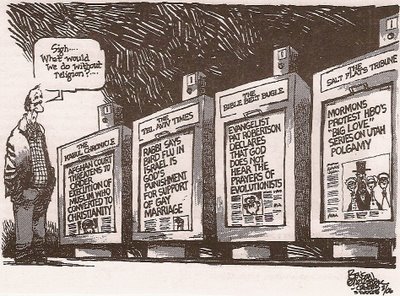REASON AIN'T ALL IT'S CRACKED UP TO BE
In other entries on this blog, I’ve mentioned that I think that reason is an afterthought, a rationalization of behavior, an excuse-making machine for actions which are based on emotion. I think the following section from Handbook of Evolutionary Psychology fits pretty well with what I’ve been thinking for a long time.
The following passage is on Page 52 in the Chapter: “Conceptual Foundations of Evolutionary Psychology” by John Tooby and Leda Cosmides.
[OPEN QUOTE]
EMOTIONS AS A SOLUTION TO THE PROBLEM OF MECHANISM COORDINATION
The preceding discussion leads us to view the mind as a crowded network of evolved, domain-specific programs. Each is functionally specialized for solving a different adaptive problem that arose during hominid evolutionary history, such as face recognition, foraging, mate choice, heart rate regulation, sleep management, or predator vigilance, and each is activated by a different set of cues from the environment. But the existence of all these microprograms itself creates an adaptive problem: Programs that are individually designed to solve specific adaptive problems could, if simultaneously activated, deliver outputs that conflict with one another, interfering with or nullifying one another's functional products. For example, sleep and flight from a predator require mutually inconsistent actions, computations, and physiological states. It is difficult to sleep when your heart and mind are racing with fear, and this is no accident: Disastrous consequences would ensue if proprioceptive cues were activating sleep programs at the same time that the sight of a stalking lion was activating ones designed for predator evasion. To avoid such consequences, the mind must be equipped with superordinate programs that override some programs when others are activated (e.g., a program that deactivates sleep programs when predator evasion subroutines are activated). Furthermore, many adaptive problems are best solved by the simultaneous activation of many different components of the cognitive architecture, such that each component assumes one of several alternative states (e.g., predator avoidance may require simultaneous shifts in both heart rate and auditory acuity). Again, a superordinate program is needed that coordinates these components, snapping each into the right configuration at the right time.
We have proposed that emotions are such programs (Cosmides & Tooby, 2000b; Tooby, 1985; Tooby & Cosmides, 1990a). To behave functionally according to evolutionary standards, the mind's many subprograms need to be orchestrated so that their joint product at any given time is functionally coordinated, rather than cacophonous and self-defeating. This coordination is accomplished by a set of superordinate programs: the emotions. On this view, emotions are adaptations that have arisen in response to the adaptive problem of mechanism orchestration. This view implies that the exploration of the statistical structure of ancestral situations and their relationship to the mind's battery of functionally specialized programs is central to mapping the emotions because the most useful (or least harmful) deployment of programs at any given time will depend critically on the exact nature of the confronting situation.
[CLOSE QUOTE]
NIETZSCHE ASKED FOR EVOLUTIONARY PSYCHOLOGY
In the passage below, I think Nietzsche was asking for science to come up with the very kind of information that evolutionary psychology is coming up with today about emotional (value) adaptations as the basis for all action.
“On the other hand, it is equally necessary to engage the interest of physiologists and doctors in these problems (of the value of existing evaluations); it may be left to academic philosophers to act as advocates and mediators in this matter too, after they have on the whole succeeded in the past in transforming the originally so reserved and mistrustful relations between philosophy, physiology, and medicine into the most amicable and fruitful exchange. Indeed, every table of values, every "thou shalt" known to history or ethnology, requires first a physiological investigation and interpretation, rather than a psychological one; and everyone of them needs a critique on the part of medical science. The question: what is the value of this or that table of values and "morals"? should be viewed from the most divers perspectives; for the problem "value for what?" cannot be examined too subtly. Something, for example, that possessed obvious value in relation to the longest possible survival of a race (or to the enhancement of its power of adaptation to a particular climate or to the preservation of the greatest number) would by no means possess the same value if it were a question, for instance, of producing a stronger type. The well-being of the majority and the well-being of the few are opposite viewpoints of value: to consider the former a priori of higher value may be left to the naiveté of English biologists. All the sciences have from now on to prepare the way for the future task of the philosophers: this task understood as the solution of the problem of value, the deter¬mination of the order of rank among values.” —Friedrich Nietzsche in On the Geneology of Morals

No comments:
Post a Comment